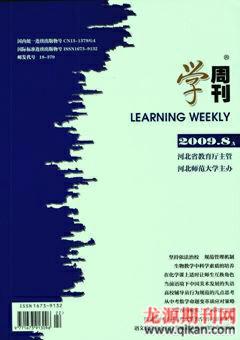虚拟语气快易通
陈淑香
虚拟语气对于英语学习者来说是块难啃的骨头,许多人望而却步。笔者经历多年的高中教学,深知英语学习者的困惑,经过探索总结出以下规律:从整体上说,虚拟语气分成两大类,一类是使用if从句虚拟情况来叙述事实内容,通过提前谓语的时态来表现虚拟情况。另一类是采用should加动词原形的形式。现就第一种虚拟语气论述如下:
虚拟语气的句子通过三种形式来考查。如表示与过去事实相反的假设必须在条件从句中用过去完成时。如:If you had worked hard, you would have passed the test.
if从句中用肯定句时,事实为否定。反之,从句是否定句时,事为为肯定。我把if从句称为第1句;主句you would have passed the test 称为第2句;事实句you didnt work hard 为第3句。由上文可知if you had worked hard 含义等于you didnt work hard,即第1句=第3句。其表现形式也分成三种:
第一种:(if第 1句,第2句)
If you had worked hard, you would have passed the test.
第二种:(第2句,but第3句)
You would have passed the test, but you didnt work hard.
第三种:(第3句,or/otherwise第2句)
You didnt work hard, or/otherwise you would have passed the test.
由以上三句我们可以看出,无论哪种形式都离不开中心句,即第2句。所以第2句的形式必须牢固掌握,尤其注意当指过去情况时用would have done 的形式。
我们又可归纳出,第2句不是和第1句在一起,就是和第3句一起出现。所以我们要找准的是第1句还是第3句。因为第1句是虚假的条件,要在事实的基础上提前一个时态,即如果是现在的事实,条件句中用过去时。如果是过去的事实,条件句中用过去完成时。反之,如果if 从句中是过去完成时,我们便知道事实是过去的,如果if 从句中用的是过去时,那么事实肯定是现在的事实。
如:If I had known her telephone number, I would have called her.
事实句I didnt know her telephone number. (if 从句用过去完成时来表达过去的事实);
If your father knew this, he would be angry.
事实句Your father wont know this. (if 从句中用过去时表达将来的事实);
If I were you, I would do it in a different way.
事实句 I am not you.(if 从句中用过去时表示现在的事实)。
由上可知,若事实句是过去时,那么中心句的形式便为would have done。
若条件句用过去时,那么中心句的形式便为would be。如:
1.—I didnt go to my evening class yesterday because I lost my textbook.
—You mine. I didnt have any class then.
A. could have borrowed B. might borrow
C. must have borrowed D. ought to borrow
解析:由上下文所知句子提供了过去的事实,所以要考查第2句即would have done 形式,即答案从A、C中产生,据句意应为A。
2.We took a taxi to the airport, otherwise we late.
A. would be B. were
C. will be D. would have been
解析:句子提供给了第3句,即过去的事实句,所以要考查第2句即 would have done 形式,即答案为D。
3.We last night, but we went to the cinema instead.
A. must have studied B. might study
C. would study D. would have studied
解析:句子中but后给了事实句,考查第2句,即would have done 的形式。D的意思更贴切,即答案为D。
4.I didnt see your sister at the meeting. If she , she would have met me.
A. has come B. did come
C. had come D. came
解析:上下文中用了第3句、第2句。所以考查的是if从句。 据事实句的过去时态,if从句应为过去完成时,即答案为C。
错综时间句:条件句用虚拟的过去完成时,中心句用现在的形式,即would do。如:
If it had rained last night, the ground would be wet now.
往往这类错综句中指的现在时态的标志性用词即now,today等。如:
If he had listened carefully, he would work out the problem now.
if 的省略,采用半倒装句,即省略if,句子变成一般疑问句的语序。提前should、had、were,当从句中用过去时时(除were外)句子不能采用倒装句的语序。如:
1.If I had known your address,I would have written to you. →Had I known your address, I would have written to you.
2.If he should fail, he would try again.→Should he fail, he would try again.
几种常见的固定句型中的虚拟语气:
1.as if(好像)
He looks as if he were a foreigner.
He talked as if he had known it before.
2.even if /even though(即使)
Even though I were as rich as you, I would not do such a thing.
3.It is high time(到什么时候了)
It is high time you went there.
4.wish (希望)
I wish I met my uncle now.
I wish I had met my uncle yesterday.
5.if only(要是……就好了)
If only I knew the answer.
If only I hadnt lost it.
6.would rather (that) (宁愿)
I would rather you stayed at home now.
You would rather he had not gone there.
归纳:从以上句子我们可以看出以上句型后面的从句内容和if从句中的形式一样。
7. but for + 名词
The rain delayed us. But for the rain we would have been here at 8 am.
But for your help, I would have failed then.
8.without + 名词
Without air, no one could live.
从but for 和without 的短语意思,我们可以看出,这两个短语给出的含意相当于if从句内容。所以肯定要考查第2句的内容,即would have done 或 would do 的形式。
第二种虚拟语气的情况是从句中谓语用should +动词原形和表达建议(suggest,suggestion, advise, advice, propose, proposal)、坚持(insist,insistence)、命令(order, command)、要求(request demand, require, requirement)、欲望(desire)、决定(decide,decision) 等词有关的名词性从句中谓语用should do,即动词后的宾语从句和真正主语从句,名词后的表语从句和同位语从句谓语要用should do 形式。should 可以省略。如:
1.I suggested that she (should) play the piano for us.
2.Its suggested that a modern hotel (should) be put up at the foot of the hill.
3.Your advice that she (should) wait till next week is reasonable.
4.My suggestion is that we (should) put off the meeting till next week.
5.The look on his face suggested that he was unhappy.
6.Tom insisted that he had already handed in his exercises.
5、6两句中的从句内容是事实或已经发生的事实,而不是没有发生的,所以从句中不用虚拟语气。
补充:
1.说话者要表示 “应该如此”、“当然”、“必要”等意思时,句中 should。
2.说话者表示“不该如此”的词语,如表示“遗憾”、“惋惜”、“惊奇”等情绪时,用should。
(1)It is a pity that he should miss such a golden opportunity.
(2)It is quite natural that she should have got angry.

